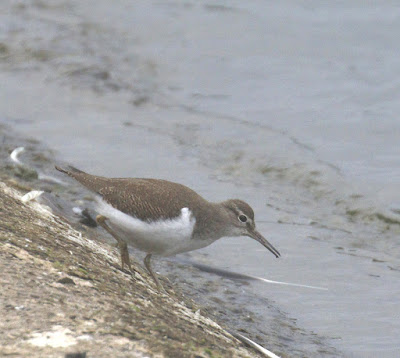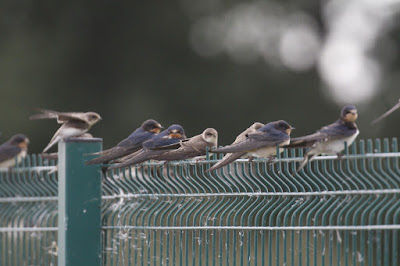It's little wonder that the weather is such a topic of conversation in our land and this weekend was a classic example of never the two days being the same.
Saturday
Based on the weather forecast that it would likely be warm and sunny I optimistically donned shorts and a tee shirt, taking a fleece to fend off the early morning chill. Just as well, as on arrival at Farmoor there was little sign of any warmth or sun and a brisk northwest wind was blowing across the grey wastes of Farmoor, creating miniature waves that crashed onto the concrete under depressingly solid grey skies that remained all morning
The fleece just about kept the windchill at bay although I certainly felt a chill around my legs but there was nothing to do but get on with it. The grey skies and strong wind had one benefit though, in that they brought down hundreds of hirundines which were demonstrating their high speed low level flying skills over the turbulent waters of Farmoor One. They were mainly House Martins, in total about four hundred with about fifty Swallows and twenty Sand Martins amongst them and best of all a juvenile Black Tern, looking for all the world like a giant hirundine as it imitated the dexterous manouevres of the smaller birds as they criss-crossed the reservoir.
The fleece just about kept the windchill at bay although I certainly felt a chill around my legs but there was nothing to do but get on with it. The grey skies and strong wind had one benefit though, in that they brought down hundreds of hirundines which were demonstrating their high speed low level flying skills over the turbulent waters of Farmoor One. They were mainly House Martins, in total about four hundred with about fifty Swallows and twenty Sand Martins amongst them and best of all a juvenile Black Tern, looking for all the world like a giant hirundine as it imitated the dexterous manouevres of the smaller birds as they criss-crossed the reservoir.
Along the Causeway a small flock of five Dunlin and three Ringed Plovers flew from the concrete apron but soon settled again and resumed their feeding or resting along the water's edge.
I watched them for a brief time but it was too cold to linger for long and I carried on walking, planning to get in the lee of the wind on the eastern edge of Farmoor One. I came across a dying Herring Gull, so weak it just lay at the edge of the water its head being battered by the wind driven waves. There was nothing I could do to save it but at least it should die in relative peace so I jumped down, picked it from the water and lay it on some soft moss higher up the concrete apron under the lip of the retaining wall.
I turned onto the perimeter track at the end of the Causeway and a Common Sandpiper ran away from me along the concrete apron but for once allowed me to get close enough to get a photograph of sorts but the atrocious light precluded any masterpiece.
 |
| Ringed Plover-juvenile |
 |
| Dunlin-juvenile |
I turned onto the perimeter track at the end of the Causeway and a Common Sandpiper ran away from me along the concrete apron but for once allowed me to get close enough to get a photograph of sorts but the atrocious light precluded any masterpiece.
 |
| Common Sandpiper |
 |
| Sand Martin |
 |
| House Martin-juvenile |
Sunday
Chastened by my experience yesterday I returned to Farmoor with a thicker fleece but still baring my legs under a pair of shorts. I need not have worried as the wind had gone completely and the grey clouds of yesterday had been banished to be replaced by warm sunshine. Yesterday's grey troubled waters on the reservoir were now a blue, glass smooth expanse with hardly a ripple in sight. What a transformation.
It was so still that the yachting fraternity were standing around having to wait for some wind to materialise before they could take to the water. I seized the opportunity to get myself a bacon roll and a cup of tea from Gill, the ever so friendly lady in the yacht club cafe. £1.50 the lot. I have said it before but it is an absolute bargain and all birders are welcome if the cafe is open. Suitably refreshed I ventured out along the Causeway and found the sun was now so warm that the fleece had to come off and I was glad of the shorts.
A Grey Heron stood stoically on one leg on the pink buoy usually favoured by the regular Yellow legged Gull which, having been usurped had moved to the other end of the reservoir to commandeer a yellow buoy all to itself. All was still.
The flock of Dunlin and Ringed Plover on the Causeway had undergone a slight change in personnel overnight and now comprised three each of Dunlin and Ringed Plover. They too were enjoying the sun and squatted or stood quietly on the concrete, littered with a multitude of discarded white feathers from the overnight gull roost. I rather like Ringed Plovers, their pleasing appearance of balanced roundness in both head and body and their lustrous brown eyes that give them a slightly anxious but benign expression all go to make them singularly appealing as far as I am concerned.
Wild birds have little if any time to relax such are the multitude of dangers they face in their lives so I left them in peace to enjoy some brief 'down time' in the sun and moved further up the Causeway. There was little else to see apart from hundreds of Greylag Geese also enjoying the sunshine. They are not stupid and had selected the concrete apron of Farmoor Two that was exposed to the full sun and sat or stood idly on their enormous bubble gum pink webbed feet, a veritable picture of indolence.
Further still a group of Canada Geese took off from the concrete apron, cackling loudly but with them was a smaller duck swept up in the turmoil of the Canada's departure. It was a Northern Shoveler which had presumably been resting with the geese and now deciding it wasn't a goose detached itself from the flock and settled on the still waters on the far side of Farmoor One.
 |
| Northern Shoveler |
Rather than trail around the reservoir looking for waders I decided to go looking for passerines in the many trees and bushes round and about the reservoir. Yesterday I had counted around a dozen Common Chiffchaffs and set myself a challenge to see how many I could find today. It was not difficult to find them, the tiny birds giving themselves away either by their querulous squeaky anxiety call or by their constant movement through the twigs and branches of the trees and bushes.
I came to a lone hawthorn with two warblers hunting flies and invertebrates in the foliage. One was a Common Chiffchaff but the other, browner with a rounded tail had me momentarily perplexed until I realised it was a Reed Warbler and quite late to find one here inland and on migration. It put on a good show for ten minutes and then flew to a distant bush.
 |
| Reed Warbler |
It was two in the afternoon and I luxuriated in this welcome day of sun and warmth. I checked an app on my phone that tells me how far I had walked. It told me 6.59 miles!






















No comments:
Post a Comment